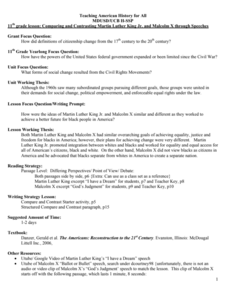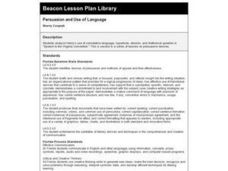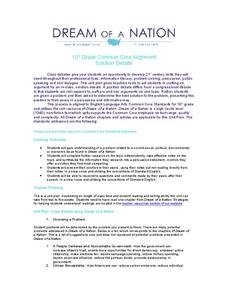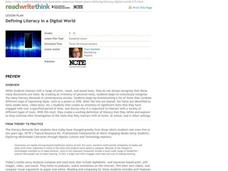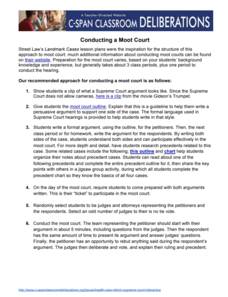National Endowment for the Humanities
García Márquez’s Nobel Prize Speech: “The Solitude of Latin America”
To conclude a study of One Hundred Years of Solitude, class members analyze Gabriel Garcia Marquez's Nobel Prize in Literature acceptance speech. After a whole-class discussion of the main ideas in the speech, individuals draft a...
K20 LEARN
Ethos, Logos, Pathos: Persuading Your Audience
Ethics, emotion, reason—scholars investigate advertisers' persuasive techniques to attract buyers. After examining the techniques used in infomercials, writers craft a persuasive essay on a topic of their choice.
K20 LEARN
Friends, Romans, Countrymen, Lend Me Your Emotions: Julius Caesar
Scholars, high schoolers, class members! With the help of this lesson, you too can identify the three persuasive appeals (ethos, pathos, and logos) the characters in William Shakespeare's tragedy Julius Caesar used to convince...
Curated OER
Putting it Together: Analyzing and Producing Persuasive Text
Young orators demonstrate what they have learned about persuasion and persuasive devices throughout the unit by analyzing a persuasive speech and then crafting their persuasive essays. Class members engage in a role-play exercise, use...
PBS
Dr. Martin Luther King Jr.’s ‘I Have a Dream’ Speech as Visual Text
Young historians watch a video of Dr. Martin Luther King Jr. delivering his "I Have a Dream" speech and answer questions that test their knowledge of the event. After discussing the fact sheet, they reread the speech, select a phrase or...
National Endowment for the Humanities
Shakespeare's Julius Caesar: Leadership and a Global Stage
Shakespeare's Julius Caesar is, among other things, the study of a ruler's ambitions. Young scholars watch videos, read articles, and keep a Commonplace Book while studying the play. At the end of Act III, pupils stage the play that...
National Endowment for the Humanities
Magna Carta: Cornerstone of the U.S. Constitution
High schoolers use the Internet to read a brief description of Magna Carta (link provided). They "walk through" the document with the teacher, identifying four major themes. Students read and discuss "The Rhetoric of Rights: Americans...
Smithsonian Institution
Cuban Missile Crisis
The United States—specifically John F. Kennedy—played a large role during the Cuban Missile Crisis. A history resource poses questions that encourage critical thinking as well as in-depth analysis of images from the time period.
Rancocas Valley Regional High School
Teaching American History for All
Although Dr. Martin Luther King, Jr. and Malcolm X both work for equal rights, social change, and political empowerment, their approaches were radically different. To better understand these contrasts, class members compare King's "I...
Curated OER
Shakespeare's Othello and the Power of Language
Learners explore the basis of Iago's persuasive power by analyzing Shakespeare's use of rhetoric and figurative language. In this Othello lesson, students analyze Iago's rhetoric in monologues and dialogues with other characters....
Curated OER
Introducing the Essay: Twain, Douglass, and American Non-Fiction
Students analyze American essayists Mark Twain and Frederick Douglass in an introduction to American literary non-fiction writing. In this essay history lesson, students identify methods for writing essays. Students read and analyze...
Curated OER
Virginia Woolf: A Room of One's Own - Shakespeare's Sister
Students, after reading and analyzing, "A Room of One's Own," by Virginia Woolf, analyze how creating and defending one's position as well as how narrative functions as a rhetorical device. They evaluate and focus in on Shakespeare's...
Curated OER
Persuasion and Use of Language
Students discuss connotative language, hyperbole, allusion, and rhetorical question. In small groups, they read one section of the "Speech to the Virginia Convention" and analyze these devices. Groups present their results to the class.
Curated OER
Approaching Walden
Eleventh graders examine their natural surroundings as a way to begin thinking about an abstract idea. They analyze and compare or contrast the rhetorical stategies of two essayists. Students interpret and evaluate images culled from...
Curated OER
Vox Populi: Brutus's Speech and the Response of the Plebeians
Tenth graders explore two rhetorical strategies (ethos and audience appeals) to analyze their effects in Brutus's speech in 3.2. They are given the opportunity to participate as members of Brutus's audience by assuming the roles of...
Dream of a Nation
Solution Debate
Class members choose a current social, political, environmental, or economic problem presented in Tyson Miller's Dream of a Nation: Inspiring Ideas for a Better America, research this problem and a variety of suggested solutions, before...
Maryland Department of Education
The Concept of Diversity in World Literature Lesson 8: Nonfiction Close Reading
As part of their study of Things Fall Apart, class members conduct a close reading of a section of Chinua Achebe's essay, "An Image of Africa: Racism in Conrad's Heart of Darkness." Jigsaw groups then compare the voice in the essay...
Close Up Foundation
Teach the Vote
Why is voting important? A social studies unit presents a non-partisan approach to the importance of voting, to voting laws and procedures, and to resources that voters need to become informed voters.
C-SPAN
Presidential Candidate Research
Don't let the young citizens in your social studies class get all their election information from inflammatory commercials and arguing pundits. Use a lesson plan from C-SPAN to guide class members through an election season with a...
ReadWriteThink
Defining Literacy in a Digital World
What skills are necessary to interact with different types of text? Twenty-first century learners live in a digital world and must develop a whole new set of skills to develop media literacy. Class members engage in a series of...
Equality and Human Rights Commission
Influencing Attitudes
Does propaganda—like that used during the first World War—exist today? The 11th instructional activity in a series of 12 highlights the role of media when it comes to influencing attitudes. Scholars learn about sensational headlines,...
C-SPAN
Should States Shift to Mail-In Voting during the Coronavirus Pandemic?
With the coronavirus pausing many norms in American society, officials are trying to decide how to safely hold voting in the 2020 presidential election. Using curated video clips, including speeches from Congress, journalists, and...
Channel Islands Film
Cache: Lesson Plan 3 - Grades 4-5
Should the excavation of what is believed to be the cave of the Lone Woman of San Nicholas Island be allowed to continue? As a practice exercise designed to prepare pupils for a timed writing exam, individuals read two Los Angeles...
C-SPAN
Conducting a Moot Court
Review the conduct of different roles within the Supreme Court. A moot court activity educates learners about the roles of each member of the court and the process of a case with video clips, research activities, a graphic organizer,...
Other popular searches
- Rhetorical Devices
- Public Speaking Rhetoric
- Gettysburg Address Rhetoric
- Rhetorical Questions
- Speech and Rhetoric
- Rhetorical Analysis
- Rhetoric Logos Pathos Ethos
- Political Rhetoric
- Speeches Rhetoric
- Rhetorical Devices in Songs
- Speech Rhetorical Devices
- Rhetorical Strategies








